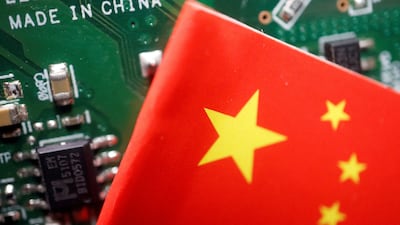China is making strides in semiconductor production deemed crucial for artificial intelligence despite US export controls and diffusion rules, a new report suggests.
Recent semiconductor analysis focusing on China says since the start of the year, Beijing has taken inventory of and redistributed some of its semiconductor production tools acquired in recent years, and in turn put them under control of China-based companies best-placed to use them.
One of those is Semiconductor Manufacturing International Corporation (Smic), China's largest chipmaker, says the report from Jefferies, an investment banking and capital market firm based in New York.

This move, according to the report, and other Beijing strategies, suggests US efforts to thwart China's progress in the continuing AI race have been less than effective.
“Smic is adding capacity in Shanghai, Shenzhen and Beijing for advanced node capacity … they will have nearly 50,000 (microchip) wafers per month of capacity this year,” Jefferies says.
Such a forecast runs counter to others by Jeffrey Kessler, US undersecretary of commerce for industry and security.
“Our assessment is that Huawei Ascend chip production capacity for 2025 will be at or below 200,000 and we project that most or all of that will be delivered to companies within China,” Mr Kessler said. He warned that China was working to blunt the impact of any US measures to slow its chip output.
The Jefferies report notes that Huawei, which has had a laser-like focus on competing with US tech firms in the AI space, could ultimately be a benefactor of China's semiconductor infrastructure plans.
“If they increase their yield, they can reach serious numbers on Huawei Ascend 910C packages,” the report said.
As another way to work around US export controls, Jefferies indicated China was using the semiconductor power of gaming PCs as “AI inferencing workstations”.
US AI tech giants such as Nvidia have been vocal about US export controls, which they have said will ultimately backfire and prevent American technology from reaching the rest of the world, therefore creating a vacuum that will be filled by Chinese companies.
Microsoft has also come out swinging against strict US export controls designed to protect the country's lead in AI development, maintaining that they hurt US efforts far more than they help in the race for dominance in the sector.

Then, of course, there's the recent developments of DeepSeek, a China-based generative AI chatbot that has boasted about achieving as much as ChatGPT but with far fewer resources. Sceptics have blamed strict US technology exports on that development.
The Trump administration has tried to engage some of the countries that might be affected by US export policies, and co-operate on AI and semiconductor efforts. But it has not reversed the broad policy objectives put in place by the Biden administration that sought to keep US AI technology out of China.
“Even if the diffusion rules are abandoned, we are unlikely to see any move that would be more China friendly,” while a complete about face is unlikely, Jefferies said,
Those in favour of strict American AI export policies might view the China semiconductor developments as proof of the need to increase enforcement and vigilance.
Mohammed Soliman said the report indicates that AI competition and the burgeoning sector overall continues at rapid pace.
“You can see in the supplier data that China isn't slowing down,” said Mr Soliman, director of the strategic technology and cybersecurity programme at the Washington-based Middle East Institute think tank.
The US “tried to slow down's Beijing's AI trajectory, but what we're seeing here is resilience and a domestic ramp up”, he said.
“The emerging bottleneck is not just semiconductors but the surrounding systems like electricity, cooling and land,” Mr Soliman added, referring to a portion of the Jefferies report that also gives China an advantage with its approach to AI and the country's ample energy supply.


